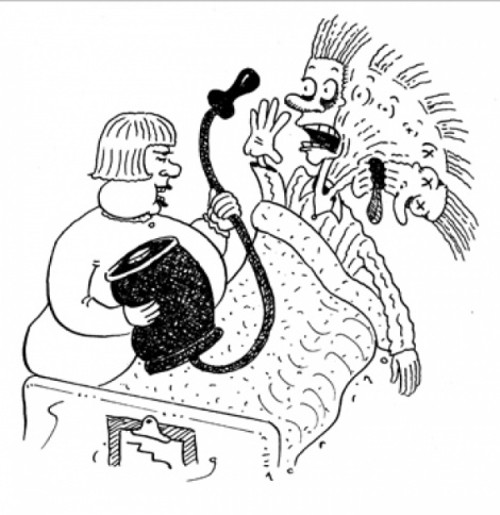We’re often told that people with some serious illness are “fighters” and that helps them survive or, conversely, that some people “give up” or the like. My question is, are such phenomena scientifically validated? Is willpower really a factor in whether you live or die?
—Nelamm18, via e-mail
Tough call. On one hand, I’ve always been skeptical about mind-over-matter claims. If willpower has nothing to do with whether or not your feet get burned from walking on hot coals, as I’d say has now been amply demonstrated, why should it cause your cancer to go into remission? On the other hand, when I get a letter like yours indicating healthy skepticism about the things we’re told (and Lord knows we could’ve used a little more of that attitude in this country in recent years), well, what can I tell you? It gives me the strength to go on.
People want to believe in willpower. In a 1989 survey of medical professionals, close to 100 percent said they recognized it and believed it made a difference—and, in pretty obvious ways, it inarguably does. For one thing, people with a positive attitude are more likely to follow their doctor’s orders. One study of breast cancer patients showed a direct relation between a positive mental state and compliance with chemotherapy, presumably increasing their chances of getting better.
On a slightly deeper level, research suggests stress can reduce your body’s ability to fight viral infections and repair damaged DNA. Depression can imbalance the immune system, leading to both reduced levels of natural killer cells and increased inflammation. So, to the extent that the will to live = reduced stress or depression, it stands to reason that a good attitude will benefit you.
With that in mind, cancer patients have been studied to see whether the will to live makes a difference. Some research has shown a link between avoiding depression and increased cancer survival. A long-term study of 205 cancer patients found that those showing fewer depressive symptoms had a roughly 10 percent greater chance of being around 10 years after diagnosis. Following a five-year study of 578 women with breast cancer, researchers reported a “significantly reduced chance of survival” for severely depressed patients and that strong feelings of helplessness and hopelessness had a “a moderate but detrimental effect.”
Then again, depression and loss of hope might simply mean you’ve got a worse case of the disease. A study of colorectal cancer patients showed a link between increased immune-system activation and depression—in other words, the cancer was seemingly driving the depression and not the other way around. Some experts, in fact, have suggested that for patients who aren’t naturally upbeat, trying to stay positive may itself be stressful, making them more vulnerable to their illness.
On the whole, research shows little to no link between willpower and survival of life-threatening illness. A study published by the American Stroke Association in 2001 showed that, while a sense of “helplessness/hopelessness” reduced the chance of survival, having a “fighting spirit” made no significant difference. Similarly, a study of 204 Australian lung cancer patients showed no link between positive outlook and survival. In light of such results it’s tempting to say that, while a positive attitude won’t help your chances, a negative attitude might make them worse. However, even that modest conclusion may be a reach. A British Medical Journal review of 10 studies of fighting spirit and 12 studies of helplessness/hopelessness found no correlation either way with cancer survival or recurrence. What’s more, individual studies purporting to show a link typically had methodological flaws or other problems.
But let’s focus on the positive, shall we? While willpower may not have much impact on disease, it can get you past other rough patches. Take Aron Ralston, who in 2003 famously amputated his own hand to escape a boulder that trapped him in a mountain-climbing accident—I’d say that showed a positive correlation between the will to live and survival. Likewise, after his plane crashed in 1994, Peter DeLeo managed to walk 13 days to safety on a shattered ankle, with a collapsed lung, one eye, no food, but clearly an ample supply of guts. Finally, let’s not overlook the story of Dougal and Lynn Robertson. While stranded at sea for 38 days with only small amounts of rainwater to drink, they gave brackish-water enemas to themselves and others on their life raft on the theory that their rectums would filter out the salt and absorb enough water to keep them alive. The book I found this story in (Surviving the Extremes: A Doctor’s Journey to the Limits of Human Endurance by Kenneth Kamler, 2004) doesn’t make clear how important rectal desalination was to the Robertsons’ survival. However, looking at the matter in context, I’d say there’s a fine line between having an indomitable will to survive and being completely nuts.
Comments, questions? Take it up with Cecil on the Straight Dope Message Board, StraightDope.com, or write him at the Chicago Reader, 11 E. Illinois, Chicago 60611.
More by Cecil Adams
-
This Is the End, My Friend
This week's Straight Dope marks the last appearance of the column as the Teeming Millions have known it for the past 45 years.
- Jul 11, 2018
-
Do Brain Supplements Do Anything?
Brain Drain
- Jul 4, 2018
-
Is flying really worse for the environment than driving?
Planes and Trains
- Jun 27, 2018
- More »




